Fleurs du Mal Magazine


Or see the index

Plainte sur la mort de Sylvie
Ruisseau qui cours après toi-même
Et qui te fuis toi-même aussi,
Arrête un peu ton onde ici
Pour écouter mon deuil extrême.
Puis, quand tu l’auras su, va-t’en dire à la mer
Qu’elle n’a rien de plus amer.
Raconte-lui comme Sylvie,
Qui seule gouverne mon sort,
A reçu le coup de la mort
Au plus bel âge de la vie,
Et que cet accident triomphe en même jour
De toutes les forces d’Amour.
Las ! je n’en puis dire autre chose,
Mes soupirs tranchent mon discours.
Adieu, ruisseau, reprends ton cours
Qui, non plus que moi, se repose ;
Que si, par mes regrets, j’ai bien pu t’arrêter,
Voici des pleurs pour te hâter.
Marc-Antoine Girard de Saint-Amant
(1594 – 1661)
Plainte sur la mort de Sylvie
• fleursdumal.nl magazine
More in: # Classic Poetry Archive, Archive G-H, Archive S-T, Archive S-T

La débauche
(extrait)
Bacchus ! qui vois notre débauche,
Par ton saint portrait que j’ébauche
En m’enluminant le museau
De ce trait que je bois sans eau ;
Par ta couronne de lierre,
Par la splendeur de ce grand verre,
Par ton thyrse tant redouté,
Par ton éternelle santé,
Par l’honneur de tes belles fêtes,
Par tes innombrables conquêtes,
Par les coups non donnés, mais bus,
Par tes glorieux attributs,
Par les hurlements des Ménades,
Par le haut goût des carbonnades,
Par tes couleurs blanc et clairet,
Par le plus fameux cabaret,
Par le doux chant de tes orgies,
Par l’éclat des trognes rougies,
Par table ouverte à tout venant,
Par les fins mors de ta cabale,
Par le tambour et la cymbale,
Par tes cloches qui sont des pots,
Par tes soupirs qui sont des rots,
Par tes hauts et sacrés mystères,
Par tes furieuses panthères,
Par ce lieu si frais et si doux,
Par ton bouc, paillard comme nous,
Par ta grosse garce Ariane,
Par le vieillard monté sur l’âne,
Par les satyres, tes cousins,
Par la fleur des plus beaux raisins,
Par ces bisques si renommées,
Par ces langues de boeuf fumées,
Par ce tabac, ton seul encens,
Par tous les plaisirs innocents,
Par ce jambon couvert d’épice,
Par ce long pendant de saucisse,
Par la majesté de ce broc,
Par masse, tope, cric et croc,
Par cette olive que je mange,
Par ce gai passeport d’orange,
Par ce vieux fromage pourri,
Bref par Gillot, ton favori,
Reçois-nous dans l’heureuse troupe,
Des francs chevaliers de la coupe,
Et, pour te montrer tout divin,
Ne la laisse jamais sans vin.
Marc-Antoine Girard de Saint-Amant
(1594 – 1661)
La débauche
(extrait)
• fleursdumal.nl magazine
More in: # Classic Poetry Archive, Archive G-H, Archive S-T, Archive S-T
Soms humoristisch, soms zakelijk, maar altijd in een volstrekt eigen vorm. De poëzie van Alfred Schaffer wordt alom geroemd om haar meerstemmigheid en schakelt moeiteloos tussen engagement en absurditeit.
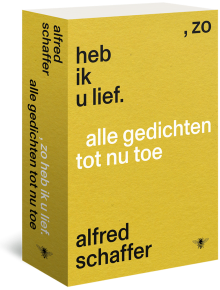 Schaffer ontving de P.C. Hooft-prijs 2021 en is daarmee een van de jongste laureaten ooit van Nederlands belangrijkste literaire oeuvreprijs. Sinds zijn debuutbundel Zijn opkomst in de voorstad (2000), die werd bekroond met de eerste Jo Peters Poëzieprijs, weet Schaffer zich constant te vernieuwen, met het vol lof onthaalde wie was ik. strafregels (2020) als meest recente uiting van zijn virtuoze dichterschap.
Schaffer ontving de P.C. Hooft-prijs 2021 en is daarmee een van de jongste laureaten ooit van Nederlands belangrijkste literaire oeuvreprijs. Sinds zijn debuutbundel Zijn opkomst in de voorstad (2000), die werd bekroond met de eerste Jo Peters Poëzieprijs, weet Schaffer zich constant te vernieuwen, met het vol lof onthaalde wie was ik. strafregels (2020) als meest recente uiting van zijn virtuoze dichterschap.
Zo heb ik u lief. alle gedichten tot nu toe brengt twintig jaar dichterschap en negen bundels samen in één band en laat zien dat Schaffer ontegenzeggelijk een van de beste hedendaagse dichters in het Nederlandse taalgebied is.
Alfred Schaffer (1973) is dichter, docent en vertaler. Hij studeerde Nederlandse Taal- en Letterkunde en Film- en Theaterwetenschappen alvorens in 1996 naar Zuid-Afrika te verhuizen, waar hij als docent verbonden was aan de Universiteit van Kaapstad. Tussen 2007 en 2010 was hij fondsredacteur van De Bezige Bij. In 2011 vertrok hij opnieuw naar Zuid-Afrika, waar hij doceert aan de Universiteit van Stellenbosch.
Nog niet verschenen. Reserveer het boek nu bij uw boekhandel. Het boek verschijnt rond 02-09-2021.
Zo heb ik u lief
Alle gedichten tot nu toe
Auteur: Alfred Schaffer
ISBN: 9789403141213
NUR: 306
Paperback
Aantal pagina’s: 736
Uitgever: De Bezige Bij
Verschijningsdatum: 02-09-2021
Prijs: 34,99
• fleursdumal.nl magazine
More in: #Modern Poetry Archive, Archive S-T, Archive S-T
Diane Seuss writes in this brilliant, candid work, her most personal collection to date.
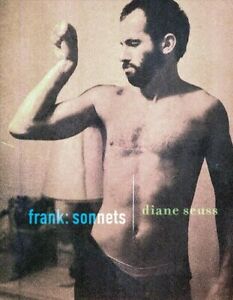 These poems tell the story of a life at risk of spilling over the edge of the page, from Seuss’s working-class childhood in rural Michigan to the dangerous allures of New York City and back again.
These poems tell the story of a life at risk of spilling over the edge of the page, from Seuss’s working-class childhood in rural Michigan to the dangerous allures of New York City and back again.
With sheer virtuosity, Seuss moves nimbly across thought and time, poetry and punk, AIDS and addiction, Christ and motherhood, showing us what we can do, what we can do without, and what we offer to one another when we have nothing left to spare.
Like a series of cels on a filmstrip, frank: sonnets captures the magnitude of a life lived honestly, a restless search for some kind of “beauty or relief.” Seuss is at the height of her powers, devastatingly astute, austere, and―in a word―frank.
“The sonnet, like poverty, teaches you what you can do / without,”
# New Poetry
frank: sonnets
by Diane Seuss
Publisher: Graywolf Press
March 2, 2021
Language: English
Paperback
152 pages
ISBN-10: 1644450453
ISBN-13: 978-1644450451
$15.99
• fleursdumal.nl magazine
More in: #Modern Poetry Archive, Archive S-T, Archive S-T
Winner of the 2021 Wandering Aengus Book Award!
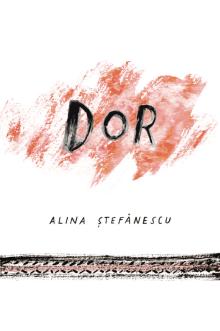 Alina Ștefănescu’s DOR is a compendium of desire, displacement, longing, and belonging. While the word “dor” itself “serves as a bridge which creates its own territory from fusion,” here Stefanescu’s words do their own act of bridging the spaces between the body and language. In these poems, tongues, like nations, have borders; nouns and verbs come alive with ownership and agency. Stefanescu writes “a good girl poem waits // for the bass.” but these are not good girl poems.
Alina Ștefănescu’s DOR is a compendium of desire, displacement, longing, and belonging. While the word “dor” itself “serves as a bridge which creates its own territory from fusion,” here Stefanescu’s words do their own act of bridging the spaces between the body and language. In these poems, tongues, like nations, have borders; nouns and verbs come alive with ownership and agency. Stefanescu writes “a good girl poem waits // for the bass.” but these are not good girl poems.
Part genealogy of influences, part meditation on love, lust, and loss, and part pointed feminist critique, DOR is a multi-faceted collection that creates a newly textured landscape of language. — Emily Holland, author of Lineage and editor of Poet Lore
Alina Stefanescu was born in Romania and lives in Birmingham, Alabama with her partner and several intense mammals. Her writing can be found in diverse journals, including Prairie Schooner, North American Review, FLOCK, Southern Humanities Review, Crab Creek Review, Virga, Whale Road Review, and others. Alina is the author of Ribald, a prose microchapbook, from Bull City Press. She serves as Poetry Editor for Pidgeonholes, Poetry Editor for Random Sample Review, Poetry Reviewer for Up the Staircase Quarterly, and Co-Director of PEN America’s Birmingham Chapter. A finalist for the 2019 Kurt Brown AWP Prize, Alina won the 2019 River Heron Poetry Prize.
Poem for the Black Bird
(. . .)
You will never forget me, Doru. No one else left
their homeland for you. Her hands shook, pressing
words into the flesh of our home. The life she was
leaving. Her notes, that winding charred necklace,
encircling us. The bird was not black.
It was the color of fire absent smoke.
I can’t forget what it spoke.
Dor
by Alina Stefanescu
English
Poetry
Paperback
Pages: 112
ISBN-13: 9780578915784
Publisher: Wandering Aengus Press
Publication date: 07/22/2021
$20.00
• fleursdumal.nl magazine
More in: #More Poetry Archives, - Book News, Archive S-T, Archive S-T
Permanent Volta is a debut collection of love poems that resist subjection and asks how we might live together outside of capitalism, providing for each other through intimate acts of care and struggle.
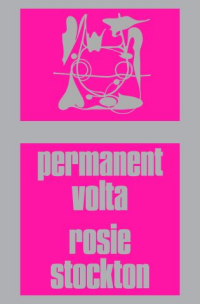 In Permanent Volta are love poems about how queer intimacies invent political and poetic forms, how gender deviance imagines post-sovereign presents and futures.
In Permanent Volta are love poems about how queer intimacies invent political and poetic forms, how gender deviance imagines post-sovereign presents and futures.
Full of bad grammar, strange sonnets, and truncated sestinas, these poems are for anyone motivated by the homoerotic and intimate etymology of comrade: one who shares the same room.
If history sees writers as tops and muses as bottoms, these poems refuse, invert, and evade representation. Here, muses demand wages, then demand the world.
Rosie Stockton is a poet based in Los Angeles. Their first book, Permanent Volta, is the recipient of the 2019 Sawtooth Prize, and is forthcoming from Nightboat Books in 2021. Their poems have been published by Publication Studio, VOLT, Jubilat, Apogee, Mask Magazine, and WONDER. They are currently a Ph.D. Student in Gender Studies at UCLA.
Review: “Stockton, who is from New Mexico, is releasing their debut book, Permanent Volta, about gender, sexuality, and love this week. It is a lush collection of poetry about the possibilities of love outside capitalism, and love as a way to resist its abuses. The poems are exceedingly relevant to our uneasy time: about hating work and being broke, but also about being in love, and needing sex, luxury, and care.”
ROSIE STOCKTON: The contradiction posed in the title is one of the main questions I was writing through in this book. As you say, if the turn is “permanent,” it exists in motion, in a constant state of becoming. I was interested in constant becoming in relation to form. Usually sonnets only have one volta, followed by some semblance of resolution in the couplet. How could a “permanent volta” refuse this resolution? I might even distill this poetic question into a familiar political question around reform or revolution: what does change look like within a given structure vs. what does it look like to change that structure? Like so many poets since the 13th century, I took the sonnet as the structure I wanted to sabotage, slow down, hustle, edge, and flood as a way to ask this question.
Poetry
Permanent Volta
Rosie Stockton
ISBN: 9781643620756
Paperback
120 pages
Published: May 18, 2021
Publisher Nightboat Books
$16.95
• fleursdumal.nl magazine
More in: - Book News, Archive S-T, Archive S-T, LGBT+ (lhbt+)
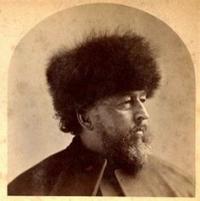
A Funeral Thought
I
When the stern Genius, to whose hollow tramp
Echo the startled chambers of the soul.
Waves his inverted torch o’er that pale camp
Where the archangel’s final trumpets roll,
I would not meet him in the chamber dim,
Hushed, and pervaded with a name-less fear,
When the breath flutters and the senses swim,
And the dread hour is near.
II
Though Love’s dear arms might clasp me fondly then
As if to keep the Summoner at bay,
And woman’s woe and the calm grief of men
Hallow at last the chill, unbreathing clay —
These are Earth’s fetters, and the soul would shrink,
Thus bound, from Darkness and the dread Unknown,
Stretching its arms from Death’s eternal brink,
Which it must dare alone.
III
But in the awful silence of the sky,
Upon some mountain summit, yet untrod,
Through the blue ether would I climb, to die
Afar from mortals and alone with God!
To the pure keeping of the stainless air
Would I resign my faint and fluttering breath,
And with the rapture of an answered prayer
Receive the kiss of Death.
IV
Then to the elements my frame would turn;
No worms should riot on my coffined clay,
But the cold limbs, from that sepulchral urn,
In the slow storms of ages waste away.
Loud winds and thunder’s diapason high
Should be my requiem through the coming time,
And the white summit, fading in the sky,
My monument sublime.
Bayard Taylor
(1825 – 1878)
A Funeral Thought
• fleursdumal.nl magazine
More in: Archive S-T, Archive S-T, Het graf van de lezer, Tales of Mystery & Imagination, Western Fiction

The Charge
of the Light Brigade
Half a league, half a league,
Half a league onward,
All in the valley of Death
Rode the six hundred.
“Forward, the Light Brigade!
Charge for the guns!” he said:
Into the valley of Death
Rode the six hundred.
“Forward, the Light Brigade!”
Was there a man dismay’d?
Not tho’ the soldier knew
Some one had blunder’d:
Theirs not to make reply,
Theirs not to reason why,
Theirs but to do and die:
Into the valley of Death
Rode the six hundred.
Cannon to right of them,
Cannon to left of them,
Cannon in front of them
Volley’d and thunder’d;
Storm’d at with shot and shell,
Boldly they rode and well,
Into the jaws of Death,
Into the mouth of Hell
Rode the six hundred.
Flash’d all their sabres bare,
Flash’d as they turn’d in air
Sabring the gunners there,
Charging an army, while
All the world wonder’d:
Plunged in the battery-smoke
Right thro’ the line they broke;
Cossack and Russian
Reel’d from the sabre-stroke
Shatter’d and sunder’d.
Then they rode back, but not
Not the six hundred.
Cannon to right of them,
Cannon to left of them,
Cannon behind them
Volley’d and thunder’d;
Storm’d at with shot and shell,
While horse and hero fell,
They that had fought so well
Came thro’ the jaws of Death,
Back from the mouth of Hell,
All that was left of them,
Left of six hundred.
When can their glory fade?
O the wild charge they made!
All the world wonder’d.
Honor the charge they made!
Honor the Light Brigade,
Noble six hundred!
Alfred Lord Tennyson
(1809-1892)
The Charge of the Light Brigade
• fleursdumal.nl magazine
More in: *War Poetry Archive, Archive S-T, Archive S-T, Tennyson, Alfred Lord

On A Shadow In A Glass
By something form’d, I nothing am,
Yet everything that you can name;
In no place have I ever been,
Yet everywhere I may be seen;
In all things false, yet always true,
I’m still the same – but ever new.
Lifeless, life’s perfect form I wear,
Can show a nose, eye, tongue, or ear,
Yet neither smell, see, taste, or hear.
All shapes and features I can boast,
No flesh, no bones, no blood – no ghost:
All colours, without paint, put on,
And change like the cameleon.
Swiftly I come, and enter there,
Where not a chink lets in the air;
Like thought, I’m in a moment gone,
Nor can I ever be alone:
All things on earth I imitate
Faster than nature can create;
Sometimes imperial robes I wear,
Anon in beggar’s rags appear;
A giant now, and straight an elf,
I’m every one, but ne’er myself;
Ne’er sad I mourn, ne’er glad rejoice,
I move my lips, but want a voice;
I ne’er was born, nor e’er can die,
Then, pr’ythee, tell me what am I?
Most things by me do rise and fall,
And, as I please, they’re great and small;
Invading foes without resistance,
With ease I make to keep their distance:
Again, as I’m disposed, the foe
Will come, though not a foot they go.
Both mountains, woods, and hills, and rocks
And gamesome goats, and fleecy flocks,
And lowing herds, and piping swains,
Come dancing to me o’er the plains.
The greatest whale that swims the sea
Does instantly my power obey.
In vain from me the sailor flies,
The quickest ship I can surprise,
And turn it as I have a mind,
And move it against tide and wind.
Nay, bring me here the tallest man,
I’ll squeeze him to a little span;
Or bring a tender child, and pliant,
You’ll see me stretch him to a giant:
Nor shall they in the least complain,
Because my magic gives no pain.
Jonathan Swift
(1667 – 1745)
On A Shadow In A Glass
• fleursdumal.nl magazine
More in: Archive S-T, Archive S-T, Swift, Jonathan
Bert Schierbeek (1918-1996), schrijver en dichter, was in de Tweede Wereldoorlog actief in het verzet, waarover hij schreef in zijn debuutroman Terreur tegen terreur (1945).
 Hij was niet alleen redacteur en bestuurslid van De Bezige Bij maar ook medeoprichter en bestuurslid van het Fonds voor de Letteren, dat financiële ondersteuning geeft aan schrijvers. Ook maakte Schierbeek zich sterk voor experimentele dichters als Kouwenaar, Campert, Andreus en Vinkenoog. Hij onderhield nauwe contacten met kunstenaars uit andere disciplines: Lucebert, Karel Appel, Johan van der Keuken, Peter Schat en Jef Diederen.
Hij was niet alleen redacteur en bestuurslid van De Bezige Bij maar ook medeoprichter en bestuurslid van het Fonds voor de Letteren, dat financiële ondersteuning geeft aan schrijvers. Ook maakte Schierbeek zich sterk voor experimentele dichters als Kouwenaar, Campert, Andreus en Vinkenoog. Hij onderhield nauwe contacten met kunstenaars uit andere disciplines: Lucebert, Karel Appel, Johan van der Keuken, Peter Schat en Jef Diederen.
Zijn roman Het boek Ik (1951) is een hoogtepunt in Schierbeeks proza. In een associatief geheel van autobiografie en essay wordt de betekenis van het woord ‘ik’ bespeeld en gezocht. Vanaf de bundel De deur (1972) werd Schierbeek ook als dichter bij een groter publiek bekend. Na die tijd bleef hij voornamelijk poëzie schrijven, steeds op zoek naar naar nieuwe vormen. Een toegenomen soberheid, ook in de typografie, valt in de laatste bundels op. Bijvoorbeeld in De tuinen van Suzhou (1986), waar het rustige tempo van de haiku in doorklinkt.
Schierbeek kreeg belangrijke literaire prijzen zoals de Lucy B. en C.W. van der Hoogt-prijs (1961), de Vijverberg-prijs (1971), de Herman Gorter-prijs (1978) en de Constantijn Huygens-prijs (1991). Najaar 2004 verschenen bij De Bezige Bij zijn Verzamelde gedichten, bezorgd en ingeleid door Karin Evers.
In 2021, 25 jaar na zijn overlijden, verschijnt zijn biografie Niemand is waterdicht door Graa Boomsma, geflankeerd door een nieuw editie van Het boek Ik. Niemand is waterdicht is de bewogen biografie van een verzetsman, een Vijftiger en een levenslange reiziger.
Net als voor zijn vrienden Remco Campert en Lucebert was de Tweede Wereldoorlog beslissend in het schrijversbestaan van Bert Schierbeek, zoals blijkt uit zijn openhartige oorlogsdagboeken. Na de bevrijding tekende hij met het genre-doorbrekende Het boek Ik protest aan tegen de naoorlogse artistieke behoudzucht en het politiek conservatisme.
Schierbeek werd niet alleen woordvoerder van de Vijftigers maar bezorgde zijn literaire vrienden ook een platform: De Bezige Bij. Voor die uitgeverij is Schierbeek gezichtsbepalend geweest als adviseur en bestuurslid
Zijn veelzijdigheid als schrijver is legendarisch: hij schreef traditioneel proza, essays, toneel, poëzie én veel vernieuwend proza. Schierbeek groeide op bij zijn grootmoeder in het Groningse Beerta en bij zijn vader in het Twentse Boekelo. Begin jaren vijftig ontwikkelde zich een moeizame ménage à trois met zijn vrouw Frieda Koch en de inwonende Lucebert. Het jaar 1970 werd een rampjaar: zijn tweede vrouw Margreetje kwam bij een auto-ongeluk om het leven.
Graa Boomsma (1953) is schrijver en essayist en sinds 1988 literair medewerker van De Groene Amsterdammer. Zijn romans De laatste tyfoon (1992) en Laagland (1999) werden genomineerd voor de AKO Literatuurprijs en de Libris Literatuur Prijs. In 2017 verscheen bij Van Oorschot zijn veelgeprezen biografie van A. Alberts: Leven op de rand.
In het voorjaar van 2021 kwam vaarwel. achtergelaten gedichten uit, een door Graa Boomsma samengestelde en ingeleide bundel met teruggevonden gedichten en tekeningen van Lucebert. Op 9 juni 2021 verschijnt van de hand van Boomsma Niemand is waterdicht, de biografie van Bert Schierbeek.
Auteur: Graa Boomsma
Niemand is waterdicht
De biografie van Bert Schierbeek
Uitgever: De Bezige Bij
juni 2021
ISBN: 9789403121611
NUR: 320
Gebonden
640 pagina’s
Prijs: € 39,99
• fleursdumal.nl magazine
More in: #Biography Archives, - Book News, - Book Stories, Archive A-B, Archive S-T, Archive S-T, Art & Literature News, Bert Schierbeek
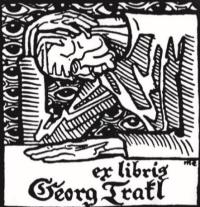
Im roten Laubwerk voll Gitarren
Im roten Laubwerk voll Guitarren
Der Mädchen gelbe Haare wehen
Am Zaun, wo Sonnenblumen stehen.
Durch Wolken fährt ein goldner Karren.
In brauner Schatten Ruh verstummen
Die Alten, die sich blöd umschlingen.
Die Waisen süß zur Vesper singen.
In gelben Dünsten Fliegen summen.
Am Bache waschen noch die Frauen.
Die aufgehängten Linnen wallen.
Die Kleine, die mir lang gefallen,
Kommt wieder durch das Abendgrauen.
Vom lauen Himmel Spatzen stürzen
In grüne Löcher voll Verwesung.
Dem Hungrigen täuscht vor Genesung
Ein Duft von Brot und herben Würzen.
Georg Trakl
(1887 – 1914)
Im roten Laubwerk voll Gitarren
Gedichte
(1909-1913)
Max von Esterle Georg Trakl Exlibris 1913
• fleursdumal.nl magazine
More in: Archive S-T, Archive S-T, Trakl, Georg, Trakl, Georg
‘De taal is m’n zuurstof, als ik iets beschrijf, ben ik er.’
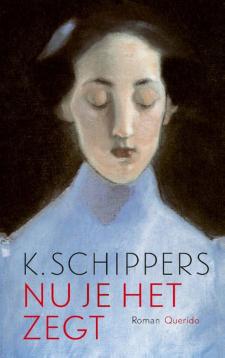 Dat denkt K. Schippers terwijl hij in Londen een adres zoekt. Hij vergist zich, loopt in een verkeerd deel van de stad, waar een straat toevallig dezelfde naam heeft. Een ondertitelaarster, een schilder uit Vietnam en andere voorbijgangers proberen hem te helpen zoeken. Komt hij samen met hen in het leven van de taal terecht?
Dat denkt K. Schippers terwijl hij in Londen een adres zoekt. Hij vergist zich, loopt in een verkeerd deel van de stad, waar een straat toevallig dezelfde naam heeft. Een ondertitelaarster, een schilder uit Vietnam en andere voorbijgangers proberen hem te helpen zoeken. Komt hij samen met hen in het leven van de taal terecht?
In een wereld vol motto’s en letterspelen leiden ze hem naar iets heel anders dan de gezochte straat. Vlak bij zee, aan de Nederlandse kust, ontdekt hij de bronnen van de taal. Het is alsof ‘de woorden die ons op de laatste paar bladzijden ter wille zijn geweest, niet anders konden dan ons hierheen brengen’. Bij K. Schippers raakt de taal zelf betoverd – met talrijke foto’s en tekeningen als bewijs.
K. Schippers (Amsterdam, 1936) is schrijver, dichter, essayist en kunstcriticus. Hij heeft een omvangrijk oeuvre op zijn naam staan, dat bestaat uit romans, poëzie, essays, verhalen & beschouwingen, en een enkel kinderboek. Al vroeg werd hij bekend door het literaire tijdschrift Barbarber, dat hij in 1958 samen met J. Bernlef en G. Brands oprichtte. Hij introduceerde de readymade als poëzievorm. Van het cultureel tijdschrift Hollands Diep, dat van 1975 tot 1977 bestond, was hij een van de oprichters en eerste redacteuren. Zijn werk is veel gelauwerd. Voor zijn poëzie ontving hij in 1996 de P.C. Hooftprijs. Een jaar later kreeg hij de Pierre Bayle-Prijs voor zijn kunstkritieken. Zijn roman Poeder en wind (1996) werd genomineerd voor de Generale Bank Literatuurprijs; de roman Waar was je nou (2005) werd bekroond met de Libris Literatuur Prijs en groeide uit tot een bestseller. Hij is de schrijver van Buiten beeld, het Poëziegeschenk van de Poëzieweek 2014.
K. Schippers
(Gerard Stigter, 1936)
Uitgeverij: Querido
NUR: 301
Paperback
ISBN: 9789021428420
Publicatiedatum: 03-06-2021
Prijs: € 18,99
• fleursdumal.nl magazine
More in: - Book Lovers, - Book News, - Book Stories, Archive S-T, Archive S-T, Art & Literature News, Boekenweek, K. Schippers, Schippers, K.
Thank you for reading Fleurs du Mal - magazine for art & literature